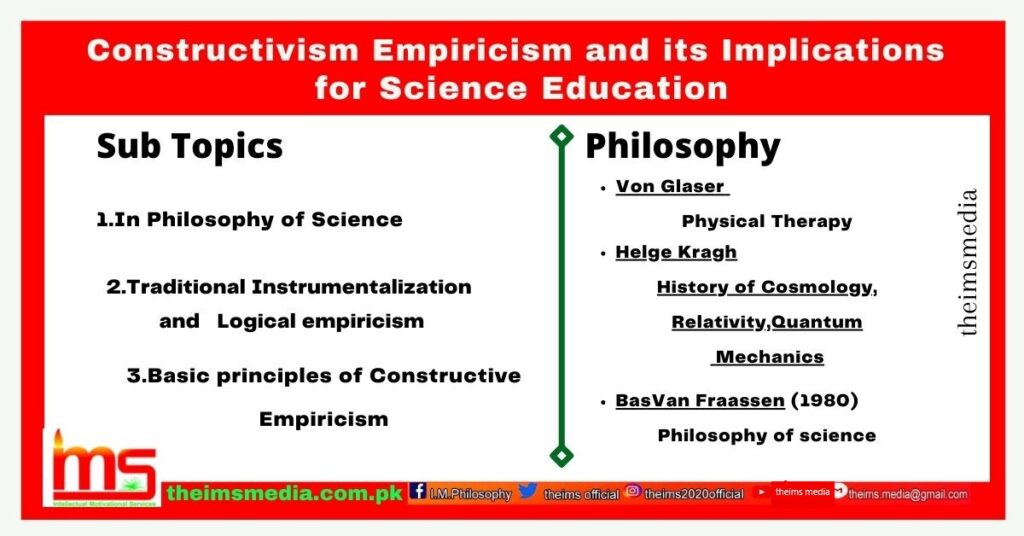
In Philosophy of Science, Constructive Empiricism is a form of Empiricism.
Meher Bano Harri
M.Sc. (Zoology), M.Ed. (Science, Education)
Course: Curriculum Development and Instructions
Important Note: This material is written for our academic notes which are published keeping in view the needs of other students.
This means that the content should be credited and the website referenced so that copyright principles are adhered to.
This material is in accordance with the curriculum of Allama Iqbal Open University Level M.Ed. So visit the University website for further study.
Full details of this content can be obtained by contacting us.
Introduction of Topic:- (تعمیراتی تجربات اور سائنس کی تعلیم پر اس کے اثرات)
While it is sometimes refer as an empiricist form of structuralism, its main proponents. Constructive empiricism is the version of scientific anti-realism promulgated by BasVan fraassen (1980).He reinvented empiricism in the scientific context, evading many of the challenges faced by logical empiricism, by adopting a realistic semantics.
His position constructive empiricism, holds that the aim of science is empirical adequacy, where theory is adequately exactly what it says about the observable things. And events in the world.
BasVan fraassen (1980) defines the views as follow:
“Science aims to give us theories which are empirically adequate and acceptance of a theory involves as belief only that it is empirically inadequate.”
Unlike traditional Instrumentalization and logical empiricism, constructive empiricism interprets theories in precisely the same manner as realism. The anti-realism of the position is due to its Epistomology. It recommends belief in our best theories only in so far as they describe observable phenomenon. And an agnostic attitude with respect to anything unobservable. The constructive empiricist’s thus recognizes claims about unobservable as true or false but does not goes so far as to believe or disbelieve them.
The result shows that constructivism contribute positive impact on educational progress as to improve students’ ability because constructivism opens the learners curiosity about something new. Students can also builds their knowledge to create and design something related to their needs.
Constructivism is a learning theory that emphasis students agency through self-guided explorations, reflections and evaluations. It encourages students to reflect, evaluate their work and identify intermediary skills to acquire based on their needs. It reflects our modern world’s vast access to content.
Vn frannssens point of view about the topic:
Van fraassens constructive empiricism does not have many of problems that plague social constructivism and scientific realism. Social constructivism has been faulted for assuming both relativistic and a subjective account of truth.
Vn frannssens point is that the only thing that is epistemologically relevant is the empirical adequacy of the theories, that is whether the theory correctly describe the empirical data.
At the same time, constructive Empiricism avoids some of the criticisms made of scientific realism. Constructive empiricism forsake metaphysical speculations and is simply concerned with whether scientific theories are empirically adequate.
Insight from both social constructivism and scientific realism can be incorporated into science education within a constructive empiricist framework even as some of their accesses are avoided. For example, Helge Kraghz point out that social constructivism tendency to put N-rays. Cold fusion, polyester and other fields of pseudo-sciences in the same category as successful cases of science.
Van-Fraassens approach avoids the metaphysical controversy altogether by sticking with empirical adequacy. Whatever the realities of N-ray and X-ray the theories in which they are embedded are different. Theories that postulates X-ray account for the available evidence whereas theories that postulates N-rays do not.
Social constructionists in science education has been stressed a number of related ideas in regard to science education. For example, they have argued that students learn best by constructing representation of the world from within rather than from being fed from the outside. However supposing this idea to be correct, it can be easily incorporated into a constructive empiricist framework. From this prospect students would be taught to construct theories that postulates unobservable entities is scientifically irrelevant.
Von Glaser point of view about the topic:
Feld has also said that social constructivism is a form of pragmatism. Thus not surprisingly pragmatic considerations are bought into his views of science education.
Let me give you a concrete example of constructive empiricism. Some science educators have developed “black boc” apparatus variously called hypothesis machines or theory boxes, as classroom tools. An apparatus is presented to the class, but its inner mechanism is hidden. Something put in machine and get something out. Students are asked to guess the hidden mechanism that produces the output, given the input. If one pretend that the hidden mechanism of the apparatus is unobservable in principle, it can be urged alternately that this apparatus teaches the basic principles of Constructive empiricism.


Picture this – 3 am in the morning, I had a line of fiends stretched around the corner of my block. It was in the freezing middle of January but they had camped out all night, jumping-ready to buy like there was a sale on Jordans. If you were 16 years old, in my shoes, you’d do anything to survive, right? I got good news though; I MADE IT OUT OF THE HOOD, with nothing but a laptop and an internet connection. I’m not special or lucky in any way. If I, as a convicted felon that used to scream “Free Harlem” around my block until my throat was sore, could find a way to generate a stable, consistent, reliable income online, ANYONE can! If you’re interested in legitimate, stress-free side hustles that can bring in $3,500/week, I set up a site you can use: https://incomecommunity.com
The point of view of your article has taught me a lot, and I already know how to improved, thank you.
Welcome. Thank you very much. We hope you will always appreciate our efforts and give your valuable feedback.
Thanks for sharing. I read many of your blog posts, cool, your blog is very good.
Welcome. Thank you very much. We hope you will always appreciate our efforts and give your valuable feedback.
Thank you for your sharing. I am worried that I lack creative ideas. It is your article that makes me full of hope. Thank you. But, I have a question, can you help me?
Thank you for your interest and valuable advice. We hope you will continue to share your insights and feedback as we move forward with our research. Since our articles are based on thorough research and verified facts, the publishing process can take some time. To stay updated, we invite you to subscribe to our blog newsletter, so you’ll receive our latest posts as soon as they’re available. For further information or guidance, feel free to reach out to us via our official email.
theims.media@gmail.com
Thank you!
Thanks for sharing. I read many of your blog posts, cool, your blog is very good.
Thank you so much for your kind words! I’m glad to hear that you’ve enjoyed my blog posts. If you have any topics you’d like me to cover or any feedback, feel free to share!